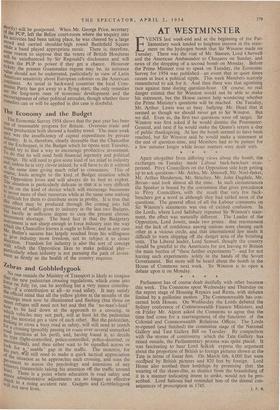T he Economy and the Budget The Economic Survey 1954 shows
that the past year has been 1:1°Ine production both showed a healthy trend: The main weak ae of reasonable progress for Britain. Overseas trade and i„,Pat was the insufficiency of capital expenditure by private industry. It is, therefore, clearly desirable that the Chancellor the Exchequer, in the Budget which he opens next Tuesday, „could try to find a way to encourage productive investment. do that he will need both financial ingeduity and political '°11rage. He will need to give some kind of tax relief to industry and, unless he is very clever indeed, he will have to do it without at the same time giving much relief to consumers. This of 'urse, leads straight to the kind-of Budget situation which the 0 PPosition loves and will always do its best to exploit. The situation is particularly delicate in that it is very difficult to hit on the kind of device which will encourage businesses . i? invest more of their resources while at the same time making this effect for them to distribute more in profits. It is true that t;''s effect may be produced through the coming into full but of reliefs given to industry in the last two Budgets, .14 hardly in sufficient degree to cure the present chronic Investment shortage. The hard fact is that the Budgetary which is not sharp enough to force industry into the way Mr. the Chancellor knows it ought to follow; and in any case aZr. Butler's success has largely resulted from his-willingness ir industry more freedom, not to subject it to closer ",,,trection. Freedom for industry is also the sort of concept with which the Opposition likes to make political play- ILarticulary when industry is not pursuing the path of invest- 'lent as firmly as the health of the country requires.


















































 Previous page
Previous page